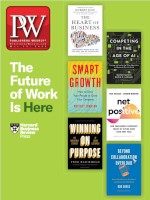In an uncertain economy, Americans are looking for new ways to pay down debt, save for retirement, and plan for the future. Books by authors who’ve done the legwork point the way.

Estate Planning 101
This “crash course in preparing for the unexpected” (per a burst on the cover) guides readers through the planning, decisions, and paperwork they’ll need to get in order before shuffling off this mortal coil. Cook and Blacklock, cofounders of the personal finance site Women Who Money, provide direction on life insurance, designating beneficiaries, writing a living will, and other necessities that ensure estates—and sanity—are protected.

The Financial Recovery Workbook
Covid layoffs and restructures have upended plenty of solid financial plans in the past year-plus, as have the usual spate of divorces, accidents, and family emergencies. CPA and financial mentor Cagan, who blogs at Single Mom CPA, walks readers through recovery from money disasters, both in the short term (which bills to prioritize) and the long (changing one’s emotional relationship to money).

The 5 Years Before You Retire
Writing with would-be retirees who hit age 60 and are dismayed by the balance in their retirement accounts in mind, “Live Like a Mensch” finance columnist Birken assembles last-minute strategies for a comfortable next chapter. This edition updates the original 2014 publication (45,000 print copies sold, per BookScan) with information on recent changes to social security, insurance, taxes, and more.
Get Good with Money
“Budgetnista” Aliche lost her early savings to a charming con man and has since built a business around helping others achieve financial security and literacy so that they don’t do the same. In her first traditionally published book, which PW called “an excellent primer for anyone looking to improve their financial picture,” Aliche walks readers through the 10 areas they need to master, including budgeting, saving, and estate planning; the goal is 100% financial “wholeness.” The book debuted on PW’s hardcover nonfiction list in early April and has sold 36,000 print copies in its first five weeks of publication.
more

Get the Hell Out of Debt
When Kelly was struggling to get out of debt, the only guides she could find, she writes, were from “middle-aged men in suits” trying to profit from managing her debt. Now she leads what she calls “transformation weekends” and delivers keynote addresses, aiming to help women change their relationship to money. In her book, which shares its name with an online course and podcast, she advises readers on ways to change their mindsets and pay off debt as a result.

Money Mountaineering
Neuwirth, an actuary, provides what he calls a “trail guide” to weathering the financial storm that readers may find themselves in post-pandemic. In order to manage the inevitable emotional fallout of hard times, he directs readers to use the six foundational principles of holistic financial wellness, a system of money management that, he writes, ensures “financial wellness over a lifetime” and does so in a way that’s “congruent with one’s objectives, constraints (i.e. life circumstances) and values.” Strategies for managing irrational responses and steeling against another disaster round out the advice.

The Rule of 30
Retirement expert and actuary Vettese frames retirement savings advice as a conversation between a young couple and their neighbor, a retired actuary. The triad determines that the hoary old wisdom about saving X% of their income, or $Y each year, is too artificially structured a plan, and that would-be retirees are better off saving in accordance with the events in their lives: more in feast years, less in famine. Flat percentages, he proposes, are simple solutions, but not always good ones.



 Volume 268
Issue 19
05/10/2021
Volume 268
Issue 19
05/10/2021






